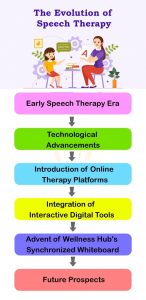Speech and Language Milestones – 6 to 7 years
By Rajini D
Last Updated: November 4, 2023
Early childhood development involves many developmental milestones, of which speech and language development is a crucial step. It feels very interesting to see how the children progress year by year. Speaking of speech and language milestones, one can observe how children learn to incorporate as many new words in their vocabulary as they can and how they find ways to express themselves. The need to communicate, exchange ideas, and make interactions can give rise to their language development.
Speech and language development is very crucial for a child’s overall growth. Between the ages of 6 and 7 years, children demonstrate a wide variety of significant developments in their ability to communicate. Their skills include both verbal and non-verbal communication abilities. Their verbal strengths include various aspects, such as the expansion of their vocabulary.
Vocabulary expansion
Word acquisition
By 6 to 7 years, children acquire a vocabulary of around 12,000 to 14,000 words. This substantial increase in their vocabulary is possible with continuous exposure to spoken language, literature, and educational activities. You can find your younger child picks words quickly than your elder one. This happens as the exposure to language is more for the younger one than your elder child.
Also read: Speech and language milestones – 5 to 6 years
Understanding abstract concepts
By seven years of age, children learn to comprehend well using nuanced vocabulary. Whenever they learn a new word, they try to use such words aptly. They would also understand and use the concepts of time, space, and emotions more accurately. Children would develop a special interest in certain areas and would develop their vocabulary in relation to their interests.
For example, if a child is very interested in cars, they would develop a good vocabulary related to names, varieties, and accessories of cars. You can find some children who are fascinated by dinosaurs and can easily articulate complex dinosaur names.
Know more about the Understanding Toddler Speech: Speech Milestones at 18 Months
Grammatical skills
Sentence structure
Around 6 to 7 years of age, children demonstrate marked improvement in constructing sentences. By now, their once simple sentences would start becoming complex, with all the conjunctions, adjectives, and proper sentence structures. They try to connect their ideas in a more cohesive manner. Their sentence framing would also vary, showcasing different models from time to time.
Use of tenses
By seven years of age, a notable gradation in the usage of verb tenses is observed. They become proficient in using past, present, and future tenses appropriately. Children learn to express themselves in a more elaborate way using perfect tenses in their mother tongue. This fosters their storytelling and communication abilities.
Usage of pronouns
Along with other parts of speech, children learn to use pronouns more accurately. They learn to distinguish between subjective (e.g., I, you, he, she) and objective (e.g., me, you, him, her) pronouns. The usage of pronouns aptly enhances their ability to express themselves clearly. For example, a child who used to say, “It is I calling you,” would now say, “It is me who’s calling you.”
Communication strategies
Narrative skills
Around 6 to 7 years of age, children would develop excellent narrative skills. They can now create stories with good beginning, middle, and end. They can demonstrate skills of understanding and creating interesting plot development by presenting various sequencing of events, not only narrating their experiences but can also imagining and add their creativity to their narratives. For instance, you can hear a child say, “That fly just flew away like a rocket. It was terrifying. Initially, it hesitated to fly, but when I blew a gush of air onto its face, it got feared and ran off.”
Read more Unlocking Speech Communication: Question Quest for Kids
Turn taking in conversations
Social communication is a tough challenge for children who are eager to express their ideas because it involves turn-taking. But as children age, they observe and learn from others. With good examples around, they can develop excellent social communication skills. Children by 6 to 7 years of age would acquire refined abilities to engage in conversations. They can learn the art of turn-taking and wait for others to finish before responding. Through this, they get a chance to understand what others have to say. This is the first step to making conversations. By around seven years of age, children learn to master these social communication skills, demonstrating increased conversational reciprocity.
Explore more on What is the Relation between Communication, Speech and Language? | Speech and Language Therapy
Expressing opinions and reasoning
Children around seven years of age express their opinions more confidently. They exhibit good reasoning skills and develop the ability to articulate thoughts. Children would also learn to provide logical reasoning to prove their points and support their opinions. For instance, a child would say, “I know that you won’t give me my toy car. It is because I broke your bottle. But that was an accident. I didn’t do it on purpose.”
Speech fluency and articulation
Pronunciation refinement
Children around this age become more refined in pronouncing speech sounds. They exhibit greater clarity in their pronunciation. Any kind of speech sound errors that linger from earlier developmental stages are usually resolved by this age. Say, if a child used to pronounce “pisghetti” previously, would now pronounce “spaghetti” clearly.
Fluency in speech
Their speech fluency continues to improve. Around this age, most children can speak smoothly without hesitations or disruptions. This fluency in speech contributes to the overall development of communication skills.
Language development
Reading comprehension
The reading comprehension skills of children would become more advanced by this age. They can understand and interpret complex texts and extract meaning from them. They would understand both narrative and informational materials.
Learn more about Learning Techniques for Students
Written skills
The writing skills would also progress significantly. Children around 7 years of age would compose more elaborate and organized written scripts. They can incorporate elements like proper punctuation and capitalization. They would also build skills to make paragraph structures.
Wordplay
Around this age, children would have a good idea of wordplay. They learn to build jokes and puns using wordplay. Their language development helps them to develop humour based on linguistic nuances. For instance, they can use the word “nuts” in a double sense to play a pun on you.
Social and Pragmatic language skills
Social awareness
Children around this age become socially more aware and follow most of the social norms in communication. They learn to build good peer interactions. They also develop a deeper understanding of nonverbal cues such as body language and facial expressions. Their overall social communication improves to a good extent during 6 to 7 years of age.
Conflict resolution
Children at this age learn to resolve conflicts effectively. They try to decrease conflicts through verbal exchange of information and ideas and also by expressing their feelings subtly. Children learn to negotiate with their peers to resolve conflicts in a more sophisticated manner.
Know about the Understanding Language Disorders: Causes and Characteristics
Receptive vs. Expressive Language Skills
| Skill Type | Examples | How to Support at Home |
|---|---|---|
| Receptive Language | Understanding quality adjectives (e.g., soft, fast) | Play descriptive games where you describe objects and have your child identify them. |
| Comprehending the meaning of quantifying words (1st, 2nd, 3rd, last) | Use everyday situations, like setting the table, to discuss order and sequence. | |
| Comprehending passive future tense (e.g., “The book will be read by mom.”) | Read stories together and discuss what will happen next, using passive voice for predictions. | |
| Expressive Language | Using conjunctions (and, if, even though) | Encourage your child to tell stories or describe events using conjunctions to connect ideas. |
| Using quality adjectives (soft, fast) in sentences | Engage in activities where your child describes objects or their day, emphasizing the use of descriptive words. | |
| Articulating all the sounds in his/her language | Play phonics games that focus on practicing tricky sounds and offer plenty of praise and encouragement. |
In the span of ages 6 to 7, children make significant strides in their speech and language development. These milestones contribute to their overall development, including academics, social, and emotional well-being. Their continued refinement of communication skills helps children learn to navigate the complexities of interpersonal relationships. They would also prepare for academic challenges, setting the stage for further growth and learning.
In the critical span of ages 6 to 7, children undergo remarkable advancements in their speech and language development, laying a strong foundation for their overall growth. The expansion of their vocabulary, improvement in grammatical skills, and the mastery of complex communication strategies showcase the incredible strides made during this period. From constructing more intricate sentences to using verb tenses adeptly and refining pronunciation, children’s linguistic capabilities flourish.
Online Speech Therapy Services at Wellnesshub
| Service | Description | Age Group | How It Helps |
|---|---|---|---|
| Individual Speech Therapy | One-on-one sessions with a certified speech-language pathologist. | All ages | Tailors strategies to the child’s specific needs, improving targeted speech and language areas. |
| Group Therapy Sessions | Small group sessions focusing on social communication and language skills. | 4-10 years | Enhances social skills, turn-taking, and conversational abilities in a peer-supported environment. |
| Parent and Caregiver Training | Workshops and training sessions for parents on supporting language development at home. | Parents of children all ages | Empowers parents with strategies and tools to support their child’s speech and language growth. |
| Language Enrichment Programs | Programs designed to expand vocabulary and comprehension through interactive activities. | 6-7 years | Boosts vocabulary, understanding of complex concepts, and narrative skills. |
| Pronunciation and Articulation Workshops | Focused sessions on improving clarity of speech and correct pronunciation. | 5-8 years | Addresses specific pronunciation challenges, enhancing speech clarity and confidence. |
| Reading and Literacy Support | Support programs aimed at enhancing reading comprehension and literacy skills. | 6-12 years | Builds foundational reading skills, crucial for academic success and lifelong learning. |
At Wellnesshub, we recognize the significance of speech and language development in a child’s overall well-being. Our online speech therapy services aim to support children in achieving these milestones through personalized and accessible interventions. By incorporating the latest advancements in teletherapy, we ensure that children receive the guidance they need to navigate the complexities of interpersonal relationships and excel in their academic journey.
Conclusion
The journey from 6 to 7 years marks a critical phase in a child’s speech and language development, pivotal for their holistic growth and readiness for future academic and social challenges. This period sees children expanding their vocabulary, mastering grammatical nuances, and honing their ability to communicate effectively, both verbally and non-verbally. Their advancements in narrative construction, comprehension skills, and the art of conversation not only reflect their linguistic growth but also their social and emotional maturity.
At Wellnesshub, we are dedicated to nurturing this essential phase of development through our tailored online speech therapy services. Understanding the importance of these milestones, our platform offers personalized support to children, aiding them in overcoming any speech and language barriers they may face. Our approach integrates the latest in teletherapy technology, making it easier for children to access the help they need from the comfort of their homes. By fostering a supportive environment that caters to individual needs, Wellnesshub plays a crucial role in ensuring that children not only meet but surpass their speech and language development goals, setting them on a path of lifelong learning and social engagement.
Frequently Asked Questions:
1. What are the key speech and language milestones for children aged 6 to 7?
Children aged 6 to 7 experience significant growth in their vocabulary, mastering up to 14,000 words. They develop complex sentence structures, understand abstract concepts, and improve in storytelling and turn-taking in conversations. Their pronunciation becomes clearer, and they demonstrate better reading comprehension and writing skills.
2. How can I support my child’s speech and language development at home?
Encourage reading together, engage in conversations about their interests, play language-rich games, and provide a variety of educational materials. Consistent, positive interaction and exposure to new vocabulary can significantly support their development.
3. What are the signs that my child might need speech therapy?
If your child struggles with expressing themselves clearly, understanding instructions, following conversations, or shows frustration when trying to communicate, it might be beneficial to consult a speech therapist.
4. How does online speech therapy work, and is it effective for children?
Online speech therapy involves interactive, one-on-one sessions with a certified speech therapist through a digital platform. It has proven effective for many children, offering convenience, personalized attention, and access to a range of digital resources that can enhance the therapy experience.
5. Can a child still develop strong language skills if they start speech therapy after age 7?
Yes, children can develop strong language skills even if they start speech therapy after age 7. While early intervention is beneficial, speech therapy can be effective at any age. Therapists can work with children to address specific challenges and build on their existing skills. Wellnesshub’s speech therapy services cater to children of various ages, offering personalized programs that focus on individual strengths and areas for improvement.
6. How can Wellnesshub’s online speech therapy services help my child?
Wellnesshub’s online speech therapy services help children by providing personalized, accessible, and engaging therapy sessions tailored to their speech and language development needs. Our experienced speech-language pathologists use evidence-based practices and interactive tools to support children in achieving their milestones, enhancing their communication skills, and preparing them for academic and social success.
7. What activities can help improve my child’s vocabulary and language comprehension?
To improve your child’s vocabulary and language comprehension, engage in activities that encourage active language use, such as storytelling, reading diverse books, playing word-based board games, and exploring new experiences together to introduce new words. Discussing the meanings of words and their context can also be very helpful. Wellnesshub provides resources and sessions aimed at enriching your child’s language through fun and educational activities tailored to their age and interests.
8. How important is non-verbal communication, and how can I help my child improve these skills?
Non-verbal communication is crucial as it enhances understanding, empathy, and social interaction skills. You can help your child improve these skills by teaching them about body language, facial expressions, and tone of voice through role-playing games and watching educational videos together. Wellnesshub’s speech therapy sessions also cover non-verbal aspects of communication, teaching children to understand and use non-verbal cues effectively.
9. Are there any technological tools or apps that can support my child’s speech and language development?
Yes, there are many technological tools and apps designed to support speech and language development. These include interactive storybooks, vocabulary games, and language learning apps tailored to children’s educational levels. Wellnesshub often incorporates technology-based tools into therapy sessions, making learning more engaging and accessible for children, and can recommend specific apps and tools based on your child’s needs and interests.
10. How can I measure my child’s progress in speech and language development?
Measuring your child’s progress in speech and language development can be done through regular assessments with a speech-language pathologist, who can provide detailed feedback and benchmarks. Additionally, keeping track of milestones, such as the number of new words used, improvements in conversation skills, and reading and writing abilities, can offer insights into their development.
About the Author:
Rajini, M.Sc., Speech-Language Pathologist (9+ years of experience)
Rajini is a passionate and dedicated Speech-Language Pathologist with over 9+ years of experience, specializing in both developmental speech and language disorders in children and rehabilitation in adults. Driven by a desire to empower each individual to find their voice, Rajini brings a wealth of experience and a warm, genuine approach to therapy.
Currently, at Wellness Hub, she thrives in a team environment that values innovation, compassion, and achieving results for their clients.
Connect with Rajini to learn more about how she can help you or your loved one find their voice.
Book your Free Consultation Today
Parent/Caregiver Info:
Client’s Details:
* Error Message









